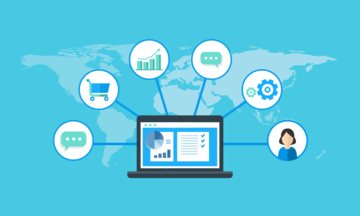Using customer relationship management instruments is an opportunity for sales teams to achieve peak efficiency. These all-in-one packages for storing client data, tracking the progress of the deal, and automating routine tasks.
However, it is as beneficial as the system that’s handling it. Choosing a vendor is not easy, considering the wide array of options in the market. This post is a concise and comprehensive guide for picking the most efficient CRM software.
What is a CRM?
When people mention CRM, they usually mean a product for establishing and monitoring connections with a company’s current and potential clients. Such systems are aimed primarily at sales departments, but their scope is much broader.
Take a look at some of the tasks companies can accomplish by implementing customer management software:
Gather and store prospect information;
Pinpoint new lead generation and marketing opportunities;
Keep logs of all interactions and formulate patterns based on the department’s performance;
Automate and manage marketing campaigns;
Manage the team, track employees’ performance.
How Does Choosing the Right CRM Solution Improves Business Growth
Tracking customers, sending follow-ups manually, using basic tools for data management makes sense up to a certain point in a company’s lifecycle. As businesses grow and develop, managers need to prioritize and delegate tasks.
CRM adoption is a mode to scale seamlessly without having to hire more managers or spend more time at work. The following are the reasons to have a CRM:
Consolidating information. A customer relationship management solution creates a centralized environment for fast and secure data centralization. All the contact data on leads, purchase history, emails, and conversation logs are stored in one cloud, protected from hacks, and accessible by all team members.
Shifting the focus from routine tasks to the customer. For one thing, CRM systems have a wide range of automation opportunities - they generate reports, send emails, and monitor campaigns. A customer will be a sales manager’s only focus - a higher level of dedication to prospects will result in higher conversions and satisfaction levels among the team.
Proactive decision-making. By being able to monitor the preferences and objections of a prospect, a sales manager will be able to resonate with the audience at opportune moments to push the deal further. Moreover, as CRM systems intelligently process information and offer data-driven insights, the sales team will be able to anticipate customers’ needs. That’ll improve the efficiency of customer service - the agents will handle inquiries faster and with higher success rates.
Analyze what went wrong. A CRM system helps a sales manager understand what issues stood in the way of closing a deal successfully. By evaluating the efficiency of promotion and marketing methods, company owners will be able to cut off fruitless investments and focus on the working ones.
Identify and eliminate risks. CRMs enable smart strategizing. By having access to trends, market forecasts, the economic landscape in any given market, you will be able to analyze opportunities and avoid uncertainties both in immediate and long-term plans.
How to Choose CRM Software: Must-Have Features
To cover all the areas of sales, human relations, marketing, look for highly functional CRMs. However, not every development team has strong sales expertise and is committed to creating an efficient tool. As a result, the CRM software market is full of mediocre or below-average products.
How to ensure you settle for a functional tool? Ensure it offers the following features:
High accessibility. Ensure everyone in the department can access the system freely from devices other than office computers. This way, a sales manager can browse prospect data on the way to the meeting or in the airplane seat. To achieve the full accessibility, most top-tier CRM systems use cloud computing.
Wide range of integrations. Sales managers want to be able to connect a CRM system to their usual toolkit.
Prospect segmentation. Dividing the target audience into groups based on time zones, locations, interests, history of interactions with the brand help businesses reach the target audience more efficiently.
Custom reporting. CRM software should provide businesses with the breakdown of every deal. A functional tool gives insights on why the deal failed or succeeded and offers suggestions on improving performance.
Campaign management. CRMs help companies automate marketing campaigns. The range of automated processes includes sending emails without human supervision, 24/7 social media activity monitoring, and receiving notifications when things don’t go as planned.
How to Choose The Right CRM Software: A Checklist
To help you navigate the sea of available tools, we created a checklist for picking the right software. Business owners or heads of sales departments have to pay attention to the following to during the selection process:
1. Stick to your niche
The first thing to check when choosing a CRM is the solution’s compatibility with the company’s niche. For areas with a high number of specific processes (finance or healthcare), choose an industry-specific tool. For e-commerce, local businesses, service providers, or product vendors, regular solutions should make the cut.
2. Choose the number of users
Depending on how many people will be using the CRM, it might not make sense to choose a vendor that charges per member. Calculate the long-term cost of choosing both a user-based subscription model or a downtime payment. This way, you will not overpay for the solution.
3. Cost of CRM
While the price is not the chief point in the checklist, it’s still essential to ensure you’re not in over your head paying for the software that you’ll not be able to keep using in the long run. Make sure a CRM is not the largest number on your ‘to-invest’ list.
4. Decide on must-have features
Outline the list of features that are crucial to achieve high performance and describe the functions for each of them. Such precise evaluation helps distinguish between two products with similar functionality.
5. Customer support
A possibility to call or email the vendor anytime and request assistance is not to be ignored either. Make sure the development team is willing to communicate and assist during employee on-boarding and offers learning content that walks users through the system.
6. Customization
While all tools share the goal to improve lead generation, the customizable ones are a cut above the rest. Management teams will be able to transfer all their processes to the system if the software allows customization.
Pick the Right CRM Integrations
In everyday life, we tend to take software integrations for granted. So, it’s only natural to assume the CRM will automatically connect to every other tool you use for sales management.
Sadly, it’s not only the case.
Not all providers offer built-in integrations. Some solutions function as a completely separate system. The lack of integrations complicates and prolongs the workflow. Keep in mind that paying for unneeded ones has no sense either.
Here are the must-have integrations:
Email - Gmail and Outlook are the most sought after integrations;
Calendar - track appointments, schedules by connecting the CRM to Gmail or Outlook;
Social media accounts - Facebook, Twitter, and other media channels;
Marketing tools - HubSpot, MailChimp, and so forth.
Tips That Help Choose the Best CRM
As deciding on the right tool is not easy, making the choice single-handedly is not easy. Here are some tips business managers should follow to make a responsible decision and choose the software that fits your needs like a glove.
1. Don’t chase the name
Don’t settle on the biggest provider, thinking that company is the best one. Instead, try to choose openly, without favorizing the tool based on popularity. More often than not, the big names offer monolith solutions that lack flexibility or innovation. Instead, choose a smaller provider that closely responds to your goals.
2. A CRM system should save time
A fair share companies spend a lot of time to customize the workspace and end up not working more productively at the end of the day. Make sure you’re not choosing management software as a trend but to solve a particular business goal a manager has in mind.
3. Find a program that scales as you do
Choosing a small, local tool is cheaper and more convenient. However, as the business expands, the solution should, too. Transferring all data to new systems comes with risks and will take time - choose a system with room for growth from the get-go.
4. A price model should fit the company like a glove
Analyzing price models is crucial. Pick the software with the plan that would help the company save more in the long run. Also, certain CRM systems have hidden costs.
NetHuntCRM - Best CRM Software
NetHunt CRM is the tool you need. With the platform, you’ll increase the potential of the toolkit the team is already using - Gmail, G Suite, Outlook, and social media.
No platform integrates with Gmail better than NetHunt CRM. It allows you to see all client data, the pipeline status, sales opportunities straight in the mailbox.
This is not a separate time-consuming system - it supports sales departments seamlessly providing them with relevant insights when needed.
Why You Need a CRM System From NetHunt
NetHunt is a minimalistic and easy-to-use - yet, in terms of features, it is on the same level as full-fledged CRM suites. Here are the instruments SME owners will benefit from:
Natively blended into Gmail’s UI;
Real-time customer information updates;
Valuable insights into the team’s performance - the number of deals in process, their status, how many leads were and were not processed, etc.
Automate email marketing campaigns, get full conversion reports;
Customize workflows or use built-in setups.
All NetHunt pricing plans have the features for monitoring deals and tracking your next customer’s engagement.
Conclusion
CRM enables improving employees’ productivity as well as overall efficiency, drive revenue. The significant numbers of competitors in the market gives more freedom in finding the software that fulfills your needs and improves the team’s performance.
Use the tips and the checklists provided above to choose management software wisely. Better yet, consider giving trying NetHunt CRM - it’s a flexible, easy-to-use, and efficient tool. It takes a few seconds to get started - set up your account and explore the free demo.







